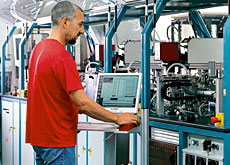Trüb knows how to play its cards right

A small company in Aarau boasts that every inhabitant of Switzerland owns at least one of its small but sophisticated products.
Trüb is a specialist in debit, credit, identity and loyalty cards, and makes between 40 and 50 million a year.
The firm, whose roots go back more than 140 years, is the producer of cards for all the leading banks in Switzerland.
“We have also been responsible for the Swiss identity card since 1994. We produce it and personalise it for the Swiss government,” Trüb’s chief marketing officer Hertor Bauer told swissinfo.
“They are so secure that they are well known all over the world. They are probably the most secure cards you can get on the market,” he added.
Securities
The history of Trüb goes back to 1859 when it began printing securities.
It still offers equities, bonds, cheques, credit notes, guarantee certificates or trademark protection certificates.
But times have changed and this sector of the business accounts today for only two to three per cent of annual sales.
“At the beginning of the 1970s when the first credit cards were introduced in Switzerland, we started to produce these plastic cards and at the same time personalise them,” Bauer explained.
“We built up all the experience producing and personalising bank cards as a first step. Due to our experience and to our security environment, we won in 1994 the tender for the new identity card [in Switzerland], so we moved from value paper to bank and loyalty cards, and then to identity cards.”
Quality
Bauer told swissinfo that one of the main challenges in making an identity card was to make sure that the quality was consistent.
“We produce about ten million identity cards every year, and the first and the last have to have the same quality,” he said.
“We have chosen a very delicate material for these identity cards and driving licences – polycarbonate – and there are only a few companies worldwide which are really capable of producing these types of cards,” he added.
After the card body has been made, the personalisation process begins, with various kinds of information being stored on a chip or on the card itself.
For example, on a Swiss identity card, you can see a photograph, name of the owner, number of the ID on a silver Kinegram, as well as a signature, date of birth and other distinguishing features of the person.
Export market
Trüb has made such a name for itself in this field that it is now producing for the export market, notably Estonia and Hong Kong.
When the company won the tender to provide ID cards for Estonia, it built a personalisation centre in the capital, Tallinn, which it runs itself.
“We produce the card physically here in Switzerland and then it is personalised in the Estonian centre and given back to the authorities,” Bauer said.
Trüb is also spreading its cards throughout the road network of Estonia. Last year, it won the contract to supply driving licences in card format that conform to European Union norms.
For Hong Kong, the company was responsible for the installation of a personalisation centre, including machines and applications.
“Optically we print the picture with laser technology. We print the name, date of birth and so on, and then the second technology is the chip,” Bauer said.
“We have to put the relevant data within the chip, for example a social security number, picture or biometrical data and there is another kind of personalisation using a machine readable zone.”
About 7.5 million electronic identity cards will be produced in Aarau and sent to Hong Kong over the coming years.
Niche market
Playing in this niche market, Trüb now has exports that contribute about 40 per cent to the company’s annual turnover, after only six years of activities outside Switzerland.
One anticipated money-spinner for the future will undoubtedly be smart cards permitting business over the internet via so-called public key infrastructure.
“You need two keys within the chip, a public key and a private key. With this and your PIN, you are capable of doing e-business. We put the keys into the chip,” Bauer said.
Sensitive data
Security at Trüb headquarters is not surprisingly very high because the company is handling sensitive data from its customers, who include governments, local authorities, banks, big retailers and public transport companies.
You feel that secure environment even before you walk into the building because all the windows are barred, not unlike a prison.
The welcome is friendly but a notice tells you that you cannot take a camera into the building. Even mobile phones with cameras built in them are not allowed past the reception area.
“Due to the fact that we produce governmental documents as well as ID, driving licence and bank cards, we have to make sure that not one can be stolen or misused. We have to make sure that data is protected,” Bauer said.
swissinfo, Robert Brookes in Aarau
Trüb was founded in 1859 when it started production of securities.
It employs about 400 people at its facilities in Aarau and abroad.
Turnover in 2004 was about SFr120 million ($101.06 million).
The Trüb group has a worldwide production of about 100 million cards a year, of which more than 20 million are smart cards.
As a supplier of comprehensive solutions certified by VISA/MasterCard, Trüb provides banks throughout the world with chip cards.
It manufactures identification, health and driver’s licences, as well as tachograph cards.
In the field of e-banking, the company offers services in PKI (Public Key Infrastructure).

In compliance with the JTI standards
More: SWI swissinfo.ch certified by the Journalism Trust Initiative
You can find an overview of ongoing debates with our journalists here. Please join us!
If you want to start a conversation about a topic raised in this article or want to report factual errors, email us at english@swissinfo.ch.